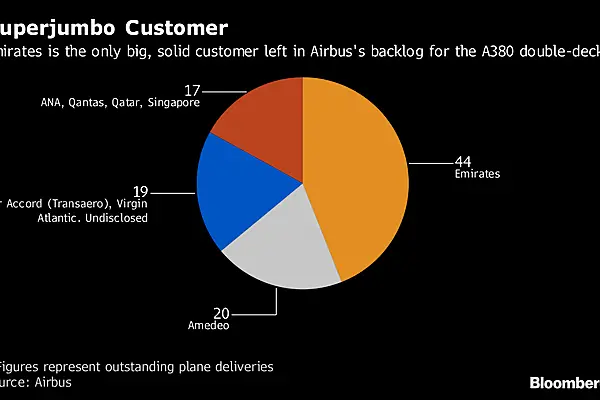Airbus SE might yet win a long-anticipated A380 superjumbo order from Gulf carrier Emirates before the end of the year, but must pledge to extend the ailing program for a further decade in order to secure the deal.
The European planemaker had planned to announce the sale at this week’s Dubai Air Show, Chief Operating Officer Fabrice Bregier confirmed in an interview Thursday, only for the purchase to fall through at the last minute.
“We expected to sign a memorandum of understanding with Emirates, who I think were very close to doing that,” Bregier told Bloomberg TV. “We will need a few more weeks. If we finalize it we will be committed to producing this aircraft, I believe, for at least for the next 10 years.”
Airbus is caught between its desire to extend the life of the A380, in service for only a decade, and a reluctance to give a long-term commitment to a plane that has long been struggling for sales. Bregier said “the principal” of a deal with Emirates would involve just such a promise, requiring it to win additional orders elsewhere and upgrade the model “massively” in coming years. “This is the plan,” he added. “We probably need to sharpen the pencils a bit.”
Emirates is interested in taking 30 to 40 more A380s, Bregier said. The Dubai-based company operates 100 of the double-deckers and has a total order book of 142 units. While the extra planes would refresh or extend the fleet, the carrier doesn’t want to make a purchase that could be worth $17 billion at list prices only to have Airbus cancel the program a few years later, leaving it as the biggest operator of a dead-end model.
Speaking at the Dubai expo, Emirates President Tim Clark said of Airbus and the A380 that “it’s their call,” adding: “It’s really for them and really for the ownership of the airline that it will not have a problem on its hands in the future.”
Clark previously urged Airbus to be more proactive in selling the A380 amid concern that it wasn’t fully behind the plane. Those suspicions have mounted with successive cuts to the monthly production rate and a failure to establish a second-hand market for the model as the oldest examples come of lease.
Bregier conceded that airlines generally aren’t convinced that they can successfully operate the superjumbo, despite positive feedback from travelers.
“This is an aircraft which is favored by the passengers, but at the same time it is seen as big by many airlines,” he said. “We need to convince them that the market will grow and they will make tons of money like Emirates.”
News by Bloomberg, edited by Hospitality Ireland









